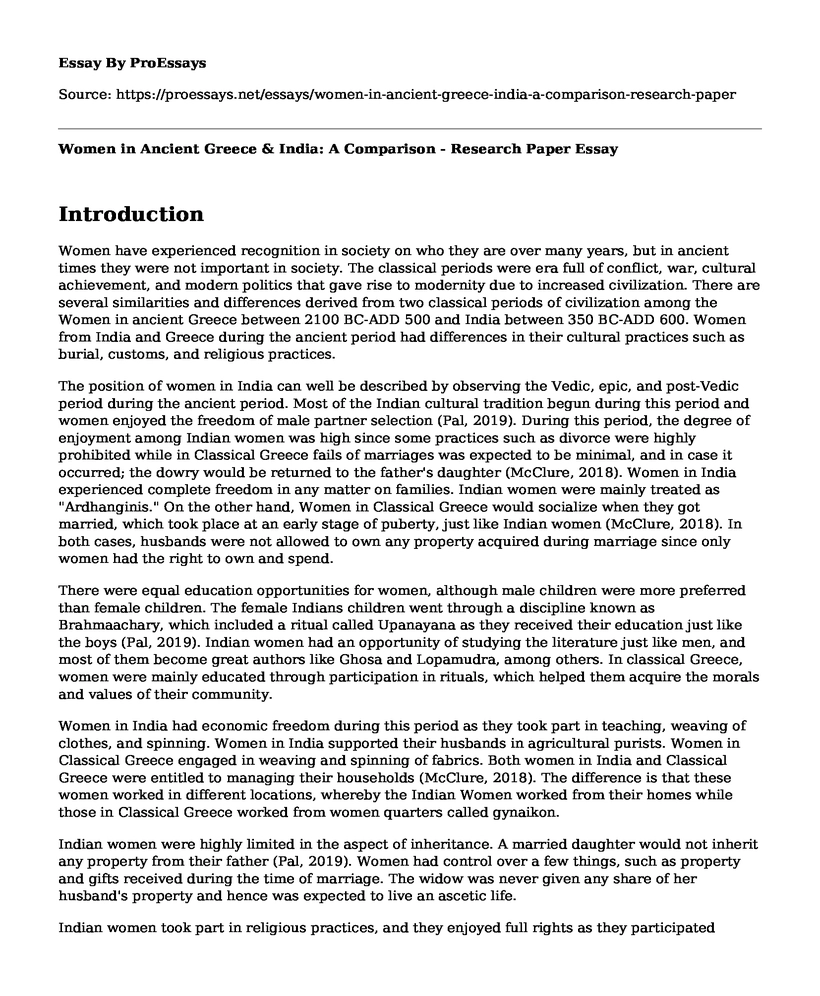Introduction
Women have experienced recognition in society on who they are over many years, but in ancient times they were not important in society. The classical periods were era full of conflict, war, cultural achievement, and modern politics that gave rise to modernity due to increased civilization. There are several similarities and differences derived from two classical periods of civilization among the Women in ancient Greece between 2100 BC-ADD 500 and India between 350 BC-ADD 600. Women from India and Greece during the ancient period had differences in their cultural practices such as burial, customs, and religious practices.
The position of women in India can well be described by observing the Vedic, epic, and post-Vedic period during the ancient period. Most of the Indian cultural tradition begun during this period and women enjoyed the freedom of male partner selection (Pal, 2019). During this period, the degree of enjoyment among Indian women was high since some practices such as divorce were highly prohibited while in Classical Greece fails of marriages was expected to be minimal, and in case it occurred; the dowry would be returned to the father's daughter (McClure, 2018). Women in India experienced complete freedom in any matter on families. Indian women were mainly treated as "Ardhanginis." On the other hand, Women in Classical Greece would socialize when they got married, which took place at an early stage of puberty, just like Indian women (McClure, 2018). In both cases, husbands were not allowed to own any property acquired during marriage since only women had the right to own and spend.
There were equal education opportunities for women, although male children were more preferred than female children. The female Indians children went through a discipline known as Brahmaachary, which included a ritual called Upanayana as they received their education just like the boys (Pal, 2019). Indian women had an opportunity of studying the literature just like men, and most of them become great authors like Ghosa and Lopamudra, among others. In classical Greece, women were mainly educated through participation in rituals, which helped them acquire the morals and values of their community.
Women in India had economic freedom during this period as they took part in teaching, weaving of clothes, and spinning. Women in India supported their husbands in agricultural purists. Women in Classical Greece engaged in weaving and spinning of fabrics. Both women in India and Classical Greece were entitled to managing their households (McClure, 2018). The difference is that these women worked in different locations, whereby the Indian Women worked from their homes while those in Classical Greece worked from women quarters called gynaikon.
Indian women were highly limited in the aspect of inheritance. A married daughter would not inherit any property from their father (Pal, 2019). Women had control over a few things, such as property and gifts received during the time of marriage. The widow was never given any share of her husband's property and hence was expected to live an ascetic life.
Indian women took part in religious practices, and they enjoyed full rights as they participated actively in sacrifices and ceremonies, just like women in Classical Greece who visited tombs, tied sashes around the grave, and brought offerings. The women in Classical Greece had the freedom of attending public speeches and visiting sanctuaries, for instance, the sanctuary of the Nymph at Akropolis's foot and Artemis at Brauron.
References
McClure, L. (2018). Women in Classical Greek Religion. In Oxford Research Encyclopedia of Religion.https://oxfordre.com/religion/view/10.1093/acrefore/9780199340378.001.0001/acrefore-9780199340378-e-256
Pal, B. (2019). The saga of women's status in ancient Indian civilization. Miscellanea Geographica. https://content.sciendo.com/view/journals/mgrsd/23/3/article-p180.xml
Cite this page
Women in Ancient Greece & India: A Comparison - Research Paper. (2023, May 02). Retrieved from https://proessays.net/essays/women-in-ancient-greece-india-a-comparison-research-paper
If you are the original author of this essay and no longer wish to have it published on the ProEssays website, please click below to request its removal:
- Written Campaign Proposal: Bullying
- Indigenous Women in Canada Paper Example
- Violence in America - Essay Sample
- Opioid Abuse and Addiction: Evaluating Prevention and Health Programs - Essay Sample
- Essay Sample on Alexander the Great: Conquering the World with Martial Leadership
- Essay on Eliminating Poverty and Controlling Pollution: Fiscal Spending Objectives
- Organized Crime: Criminal Organizations, Terrorist Groups, and Militias - Essay Sample







